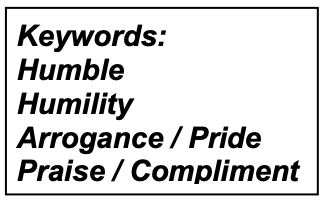Majlis Ugama Islam Singapura
Friday Sermon
31 October 2025 / 9 Jamadilawal 1447H
The Humility of a Muslim

Dear blessed congregation,
Have taqwa and be conscious of Allah s.w.t., the One who created us. Fulfil all His commands and avoid all His prohibitions. Adorn ourselves with noble character and abstain from arrogance and pride towards others. May Allah s.w.t. grant us blessings and goodness in our lives. Amin, ya Rabbal ‘Alamin.
Dear congregation,
What is the value that distinguishes a servant of Allah from one who has forgotten that he is a servant? The answer does not lie merely in our faith or deeds. Nor is it determined by our status or quality of life. Rather, the value that should adorn every believer (mukmin) in any circumstance is humility (tawāḍu’) – a quality that stems from our iman and radiates through our character.
Allah s.w.t. says in Surah Al-Furqan verse 63:
Which means: “And the servants of the Most Merciful are those who walk upon the earth humbly, and when the ignorant address them, they say “Salam’, that is (words of) peace.”
This verse beautifully portrays the character of a believer who is humble. Such a person does not boast, act arrogantly, or look down on others.
At the same time, true humility does not mean showing weakness or lowering one’s dignity. It also does not mean humbling oneself for worldly gain from mankind. So, what does tawāḍu’ or humility truly look like?
According to Imam al-Ghazali, the answer lies in how we interact with others who are of the same stature as ourselves, or of lower status in the eyes of people.
An example of humility is a person who has status, influence, wealth, or seniority, yet does not feel superior to others. Such a person is open to engaging with people, exchanging views, receiving advice, and appreciating the goodness and strengths of others.
My dear brothers,
Prophet Muhammad s.a.w. is the best example of humility. He was the leader of all mankind, and a mercy to the worlds. Yet, how was his response when he received compliments from others? Consider this hadith narrated by Imam al-Bukhari:
A man once came to the Prophet s.a.w. and addressed him by saying, “O best of mankind!” To this, the Prophet s.a.w. replied:

Which means: “That is Prophet Ibrahim a.s.”
Subhanallah, such was the noble character of Rasulullah s.a.w. Although he was clearly deserving of the title “the best of mankind”, he did not allow such praise to inflate pride or arrogance within himself. Instead, he redirected the praise and honour to a prophet before him, Prophet Ibrahim a.s.
This is the attitude of a true believer. Regardless of the titles given to him, he always remembers his position as a humble servant of the Most Merciful.
Therefore, we too must ask ourselves: how do we respond to compliments or praise? How can we nurture humility when we attain success or recognition?
The sermon hereby shares two key lessons on humility as guidance for us all:
First: True humility arises from the awareness that every blessing comes from Allah
Whether one is an excellent student, a successful member of the workforce, a respected leader, or anyone else. Humility guards the heart from boastful pride and arrogance.
Instead, it teaches us to acknowledge that all goodness and success come from Allah, often through the support of our parents, colleagues, staff, and the people around us.
Humility shifts the attitude of “I achieved this success” to the realisation that “Allah granted me this success”. Therefore, whenever we receive blessings or achieve something good, let us recognise it as a gift from Allah and pray for His continued blessings.
Second: Humility shapes our manners and social character
Humility is not only an intrinsic or inner quality but also manifests in how we behave with others. In a hadith narrated by Muslim, the Prophet s.a.w. said that which means: “Indeed, Allah has revealed to me that you must be humble, so that no one oppresses another, and no one becomes boastful over another.”
A community which inculcates humility becomes one of good character and respectful conduct. It teaches us to avoid belittling others or feeling self-important. Humility opens our hearts, reduces envy, restrains judgment, encourages forgiveness, and keeps us grounded even when we are in a position of advantage.
Dear brothers in faith,
In a world that often values influence, social perception, and worldly achievement, humility is a shield which protects our hearts. It reminds us that behind every success lies the contribution of others, and above all, the grace of Allah s.w.t.
Let us strive to make tawāḍu’ or humility a reflection of our character and a guiding principle in our lives. Humility is not a weakness; it is a sign of strong iman.
May Allah s.w.t. grant us hearts free from arrogance, souls that bow in humility before Him, peace through our acts of obedience, and abundant blessings in our lives. Amin, ya Rabbal ‘Alamin.

Second Sermon

Dear blessed congregation,
Whoever we may be in the eyes of mankind, we remain in need of Allah’s assistance. Therefore, let us strengthen our efforts with sincere prayers and deep faith in Him.
In this examination period, let us pray that all students and our children are granted peace in their hearts and a clarity of mind, so that they may face their tests with assurance. May all parents, family members, and teachers also be blessed with wisdom and patience as they guide and provide support to the students.
May Allah grant us all beneficial knowledge and allow us to benefit from the knowledge we have learned. Ya Allah Ya Samī’ Ya ‘Alīm, instil in our hearts true knowledge and sincere faith, so that we may attain everlasting success.





